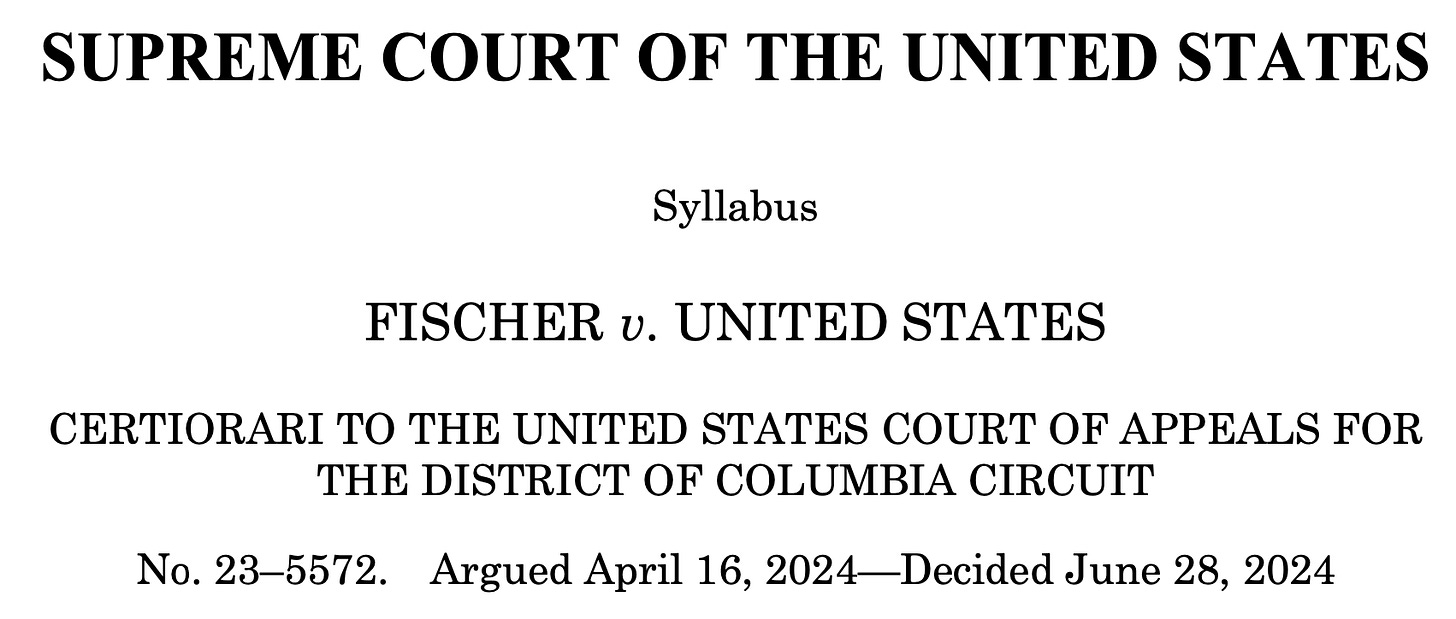Apparently 8 Months Was Not Enough Time For DOJ To Figure Out A Solution To Its Fischer Problem.
DOJ is asking for as long as another 60 days to come up with a creative solution to how it might still use Sec. 1512(c)(2) after Fischer v. United States -- while punting on some cases now.
The Supreme Court issued its decision in Fischer v. United States on June 28, 2024 — three weeks ago as of tomorrow. In that decision the Court held that the Dept. of Justice had been wrongly using 18 U.S.C. Sec. 1512(c)(2) to prosecute January 6 defendants for "obstructing Congress" -- that statute only applied to impairing objects or things of evidentiary value, with that impairment resulting in the obstruction of Congress.
As most know, DOJ was misinterpreting the language of the statute by employing it as a “dragnet” -- covering any conduct that "obstructed" Congress, of whatever kind or nature, as the basis to charge and convict January 6 defendants. The general approach was to charge a violation of Sec. 1512(c)(2) for any obstructive conduct directed at the proceedings, as opposed to conduct intended to impair evidentiary records/objects/things that might be used in the proceedings as was intended by Congress when it amended the statute in 2005.
Before I start, it is worth revisiting the sequence of events that led to the Fischer case being decided by the Supreme Court — and why the decision should not have come as a surprise.
The decision of the Appeals Court, which Joseph Fischer appealed to the Supreme Court, was handed down in April 2023. Mr. Fischer’s attorneys filed a Petition for Writ of Certiorari with the Supreme Court in September 2023. The Petition is only a request that the Court hear the case — it is not the actual “briefing” of the case. That comes only after the Court agrees to hear and decide the issue.
In federal criminal cases, the Solicitor General’s Office receives a copy of every Cert Petition filed by a defendant in a federal case. The SG has the option of filing a Response or a notice with the Court that it will not respond. In Fischer’s case, the SG’s Office filed a notice that it would not file a Response to the Petition.
But in early October 2023 the Supreme Court directed the SG’s Office to file a Response to the Petition — it wanted to hear from DOJ on the question of whether it should consider the question posed by Fischer as to DOJ’s broad interpretation of Sec. 1512(c)(2). That was the first indication DOJ should have taken note of that its legal position was not necessarily on solid ground.
The SG’s Office filed a Response on October 30, 2023, urging the Court to not take up the Fischer case and arguing that the Appeals Court had correctly resolved the question by endorsing the DOJ’s broad interpretation of the statute.
On December 13, 2023 — six weeks later — the Supreme Court granted the Petition and scheduled the case for briefing and oral argument. The Court would decide if DOJ had been correctly interpreting and applying the statute to January 6 cases. That was more more that six months before the decision, and more than 8 months since the Court directed the SG’s Office to Respond to the Petition.
But based on the events of the past 3 weeks, it’s almost like no one at DOJ ever imagined they might lose Fischer — they need ANOTHER 60 days to decide what they are going to do.
Keep reading with a 7-day free trial
Subscribe to Shipwreckedcrew's Port-O-Call to keep reading this post and get 7 days of free access to the full post archives.




